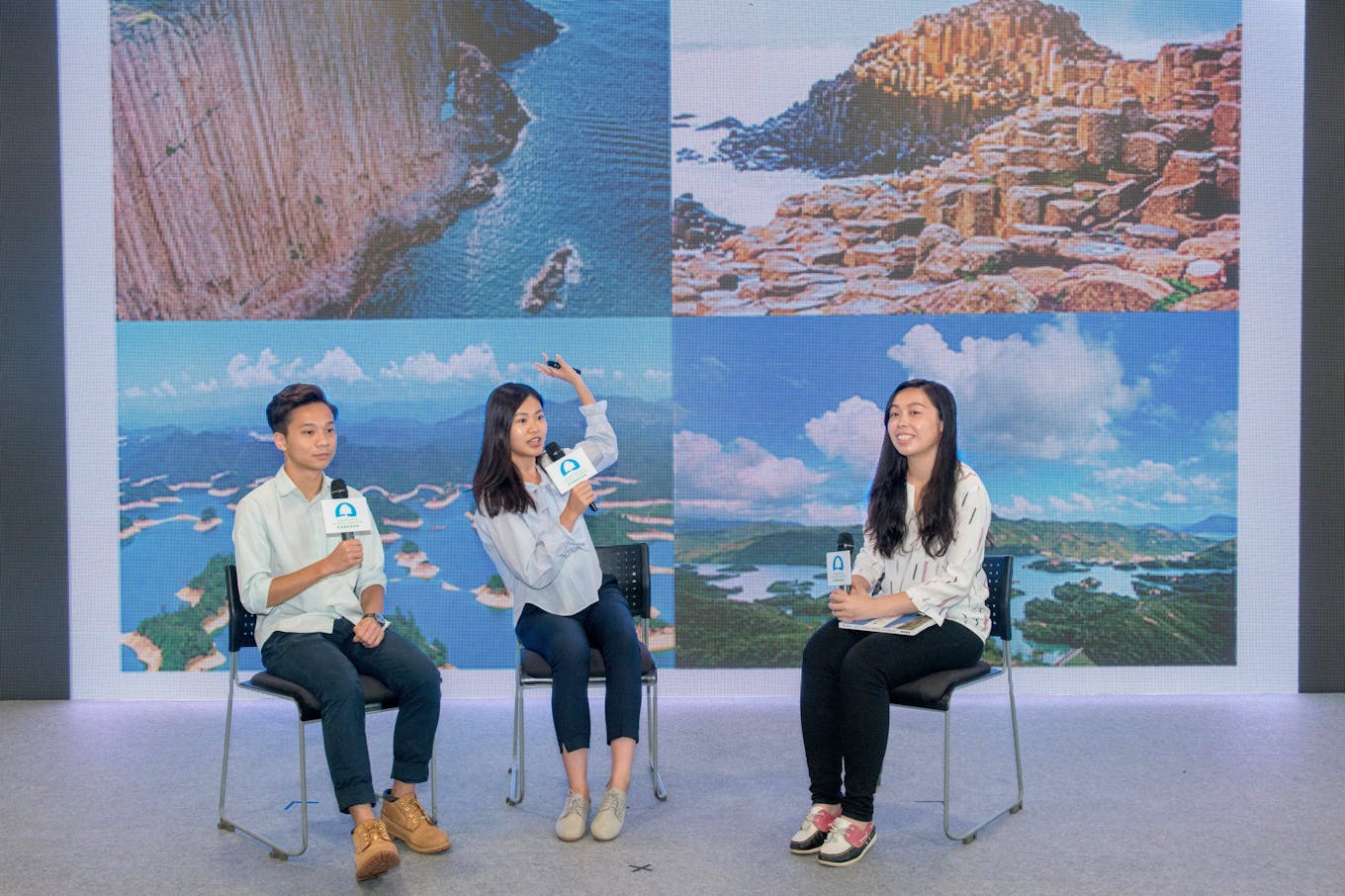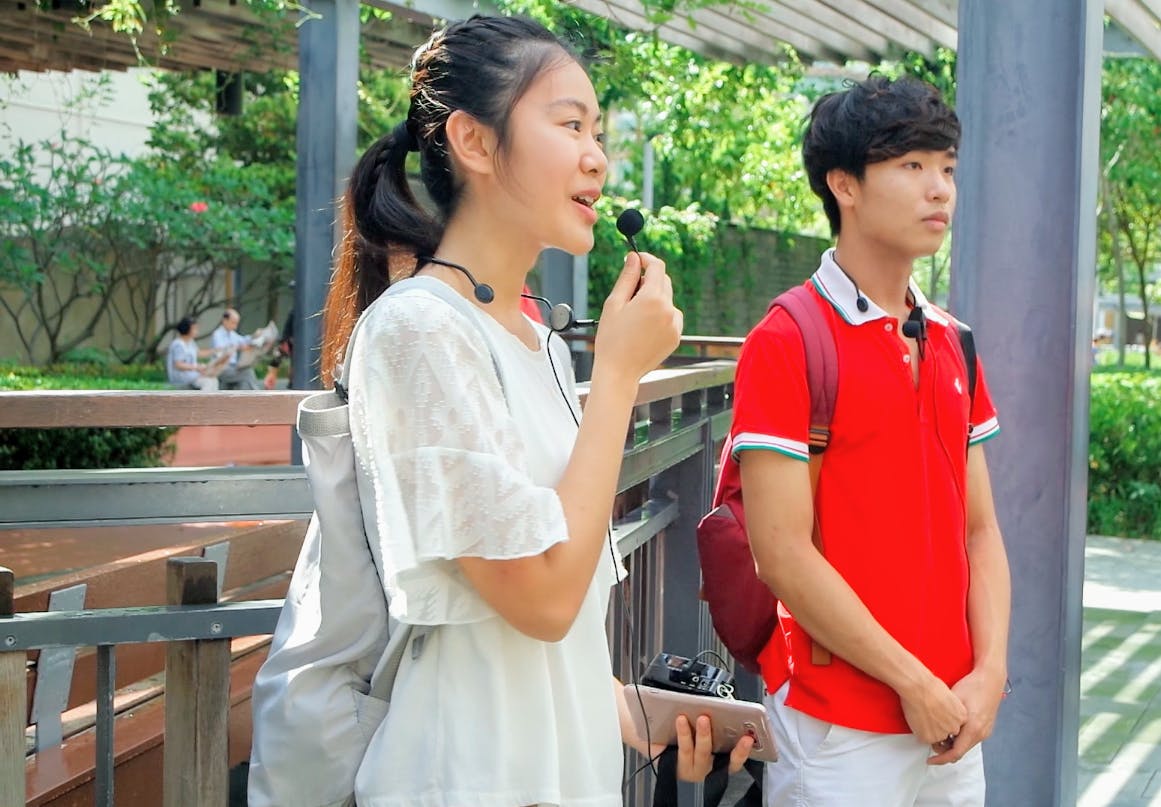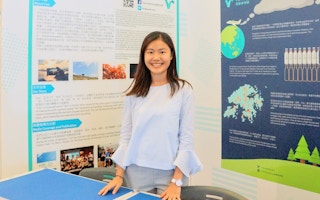Back in 2015, after learning that air travel accounted for more than 25 per cent of carbon emissions per capita in Hong Kong, Natalie Chung realised how much her travels abroad contributed to climate change.
An equally puzzling fact for Chung was that this figure was not captured in government data as the carbon emissions of international flights were considered cross-boundary emissions.
In her first year of university, she started V’air, a platform dedicated to showcasing different scenic attractions in Hong Kong, to promote local tourism as an alternative to getaways.
Five years on and V’air has grown to become an environmental education organisation that organises eco-tours to country parks, rural areas and green facilities around the city. The team also coordinates outreach programmes that encourage participants to interact with and learn more about local ecology.
Chung quickly learnt that the first step to environmental education is exposure to the natural environment. “If you’ve never been to a country park, how would you have the awareness to conserve it when it’s turning into a property development? Bringing people out into nature is the best way for them to understand and experience the intrinsic value of nature,” said Chung.
“
[Pursuing sustainability] can be a lonely journey, as I witness my friends go into professional industries and enjoy easy lives. But I would rather think about what we can do to create a positive impact despite how destructive the current system is.
Her latest initiative with World Economic Forum Global Shapers, a community of youths driving change and action, involves building up a sustainability mentorship programme that bridges mentors with passionate students. Chung believes that this important bridging tool will allow students to learn about how industry experts build up their portfolio and excel in their current positions.
“Personally, I’m feeling the struggle in making the right career choice even with the many resources that I already have. I hope this programme helps other students pursuing a career in sustainability too,” she said.
In this interview with Eco-Business, Chung shares her sustainability role models, the importance of working around existing systems, and her dream job of becoming the Secretary for the Environment in Hong Kong.
What are you studying?
I’m doing a Master of Philosophy in environmental change and management at the University of Oxford, which is a two-year programme.
My previous degree was a Bachelor of Social Science in geography and resource management at the Chinese University of Hong Kong, which is where I developed my interest in environmental management and policy design.
When did your interest in sustainability begin?

Chung sharing about a low-carbon lifestyle at a flagship event for the World Environment Day 2018, organised by the Environmental Campaign Committee. Image: Natalie Chung
My passion for environment-related subjects was developed in primary school. In the last year of primary school, I did a project on climate change, which was hosted by the Hong Kong Observatory. For the project, we got to interview a polar explorer in Hong Kong, Dr Rebecca Lee Lok Sze. She talked to us about her experience at the two poles and shared the simile that climate change is like trapping the earth in an oven which is continually increasing in temperature. That planted a seed in my mind.
I studied geography in high school and university for its emphasis on the environment and sustainability and realised that I’m more inclined towards the social aspects of the issue. But in Hong Kong, there are not many degrees specifically focused on environmental management at an undergraduate level. That’s why I was determined to pursue a postgraduate degree.
What are the things you look for in a company when applying for sustainability jobs?
I consider the values of the company, and whether ESG (environmental, social and governance) issues are factored into their decision-making. And it’s not just about completing a sustainability report, but actively trying to improve existing practices out of a genuine commitment to sustainability. This will drive the team to propose new benchmarking principles to motivate their company to perform better.
To have a better understanding of an organisation, I recommend reaching out to people working there and asking how they feel about the organisation.
Which companies do you admire for their approach to sustainability and why?
Doughnut Economics Action Lab is an organisation that I deeply admire. It was founded by one of my lecturers at Oxford, Kate Raworth. She is an author of the book Doughnut Economics, which proposes a framework to perceive sustainable development. It is an alternative metric to measure human well-being, contrary to the traditional GDP metric that only considers economic success.
The centre ring represents our basic social and developmental needs, while the outer ring is the ecological ceiling. The doughnut framework assesses how well we meet the basic needs of our most vulnerable communities while keeping human development within the planetary boundaries. The most ideal scenario is a regenerative and distributive economy lying in the doughnut, hence the safe and just operating space for humanity.
Her lab turns the economic concept into an action-oriented approach, working with cities to integrate this model into their city-planning. Recently, she succeeded in persuading the Amsterdam city government to adopt the doughnut model into their post-Covid city planning.
To date, the global economy has been driven by continued growth, but it’s important to question if that’s needed in the world today. Echoing Kate, a healthy economy should be designed to thrive, not grow. We should focus on how systems interact with one another, and design innovative solutions which benefit both humanity and other species.
“
[Many people] think that nothing good can be done under this not-so-equitable and not-so-sustainable system, so they just resort to doing nothing, which perpetuates the current system.
In the context of Hong Kong, property development companies have huge amounts of resources which can be leveraged for sustainable development. Ellie Tang is a sustainability practitioner in a real estate company that I respect. She initiated a climate assessment to determine the impact of extreme events on their properties in Hong Kong and China.
Speaking with Ellie, she told me the assessment was a two to three year process, in which they compared different existing methodologies before choosing the best one for the company.
I admire the team’s professionalism; they didn’t take a check-box approach where they picked the first or cheapest company to do the job. This showed that they’re doing it to make an actual difference, not just for the sake of reputation.
Who are your sustainability role models?
An important role model of mine is Muhammad Yunus, the 2006 Nobel Peace Prize Laureate. I really like his idea of social business, where businesses are driven by altruism and thinking about how to improve the world.
It’s part of the reason why I founded V’air—Yunus was telling university students that we are privileged and have many talents. If we can’t find a job that fits our goals and visions, another option is to start your own social business to solve existing problems in the world, because we have the responsibility to make society better.

Chung leading a low-carbon green tour for the public with V’air, beginning at Aldrich Bay. Image: Natalie Chung
Many people believe that the entire system has to be disrupted before anything can be done. They think that nothing good can be done under this not-so-equitable and not-so-sustainable system, so they just do nothing, which perpetuates the current system.
But Yunus shows us through his work in microfinance that we can achieve the three-zeros—zero poverty, zero unemployment and zero net carbon emissions—just by working around and adding new values to existing systems.
It’s something that I’ve kept in mind to motivate myself because sustainability can be a lonely journey, as I witness my friends go into professional industries and enjoy easy lives. But I would rather think about what we can do to create a positive impact despite how destructive the current system is. The existing system is not an excuse to stop trying.
What’s your dream job?
The Secretary for the Environment in Hong Kong. Hong Kong is a small city, but we’re still contributing significantly to the global greenhouse gas emissions. We have a lot of resources to leverage on but our ambition has to step up.
It would be a great chance for me to develop policies with a regenerative mindset, like how circular economy can take flight in the city, and how this financial capital can become a green finance hub.
I would also strive to protect the existing natural resources, which are highly abundant and diverse. In Hong Kong, we face huge developmental pressure for building infrastructure and residential flats. Many people eye the country parks and green belts, but ignore the development potential of brownfield sites.
It’s interesting to note that despite the pressure on public housing, most lower income families actually do not support developing country parks into houses. This is because green belts are essential free pockets of nature for leisure and recreation among low income groups. In contrast, middle and upper class can easily go abroad for a breath of fresh air.
I often reflect upon the question – How can we change the narrative in way that development and nature conservation will no longer be competing interests? The trade-off between development and conservation is a recurrent and dominant debate especially in Hong Kong where land is scarce. This is an issue I will continue to reflect on with the mission of balancing different interests in mind.
What advice would you give other sustainability students?
Grow your own initiative to impact your immediate surroundings and the broader community. Don’t be afraid to start from the ground, each small step amounts to the end goal of systemic change. This is what I learnt from my journey of starting V’air, the gradual process of inculcating values into minds.
Reach out to leading experts in this field, observe what they’ve been through and learn from them. Establishing and maintaining connections are important channels to amplify your influence through collaboration.
In addition, sustainability covers a diverse range of topics from equal opportunities to carbon reduction. So to be competitive in this field, you should read widely and keep updated with recent sustainability trends. Keep striving to improve, and share resources with like-minded individuals for a greater impact. Only through collective action can we shape our sustainable common future.















